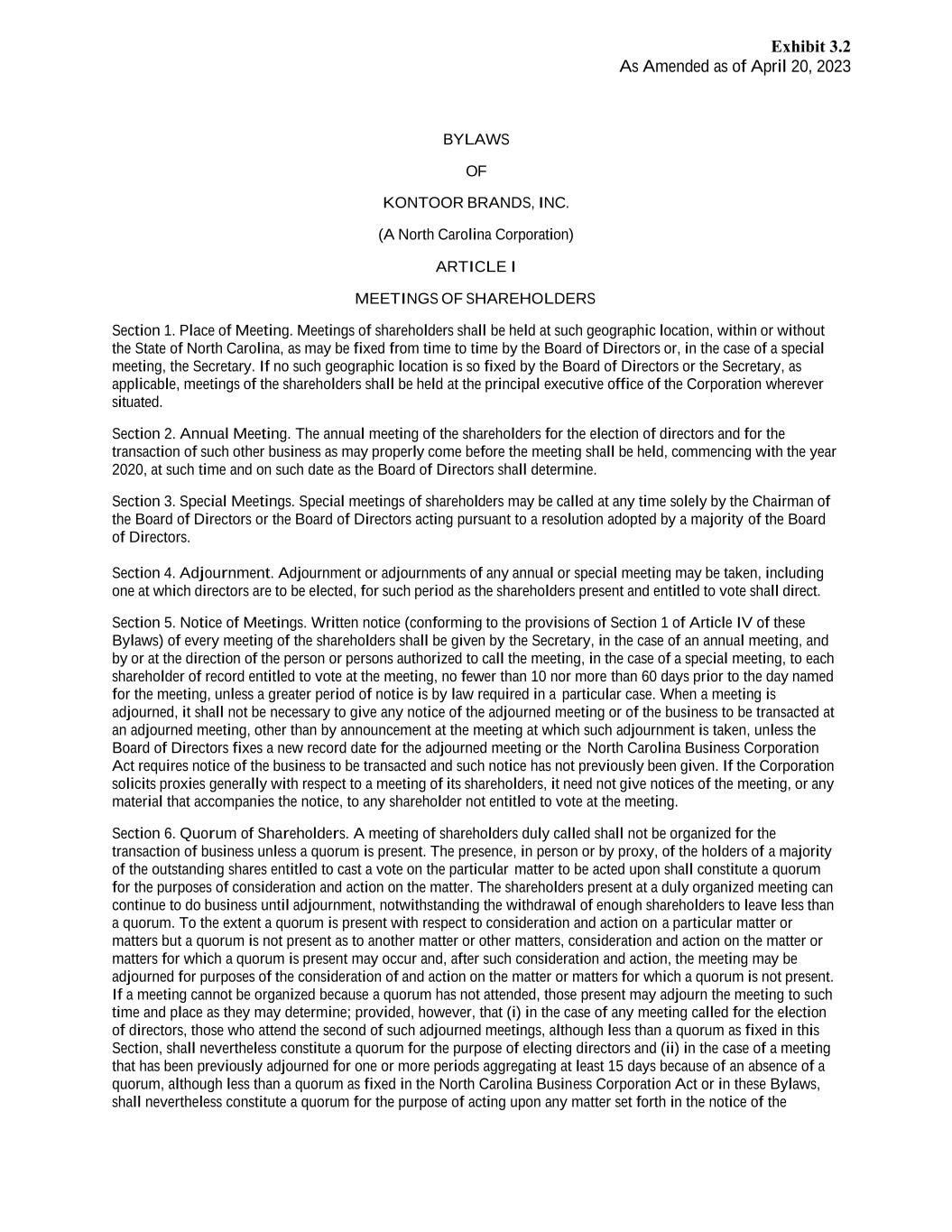
As Amended as of April 20, 2023 BYLAWS OF KONTOOR BRANDS, INC. (A North Carolina Corporation) ARTICLE I MEETINGS OF SHAREHOLDERS Section 1. Place of Meeting. Meetings of shareholders shall be held at such geographic location, within or without the State of North Carolina, as may be fixed from time to time by the Board of Directors or, in the case of a special meeting, the Secretary. If no such geographic location is so fixed by the Board of Directors or the Secretary, as applicable, meetings of the shareholders shall be held at the principal executive office of the Corporation wherever situated. Section 2. Annual Meeting. The annual meeting of the shareholders for the election of directors and for the transaction of such other business as may properly come before the meeting shall be held, commencing with the year 2020, at such time and on such date as the Board of Directors shall determine. Section 3. Special Meetings. Special meetings of shareholders may be called at any time solely by the Chairman of the Board of Directors or the Board of Directors acting pursuant to a resolution adopted by a majority of the Board of Directors. Section 4. Adjournment. Adjournment or adjournments of any annual or special meeting may be taken, including one at which directors are to be elected, for such period as the shareholders present and entitled to vote shall direct. Section 5. Notice of Meetings. Written notice (conforming to the provisions of Section 1 of Article IV of these Bylaws) of every meeting of the shareholders shall be given by the Secretary, in the case of an annual meeting, and by or at the direction of the person or persons authorized to call the meeting, in the case of a special meeting, to each shareholder of record entitled to vote at the meeting, no fewer than 10 nor more than 60 days prior to the day named for the meeting, unless a greater period of notice is by law required in a particular case. When a meeting is adjourned, it shall not be necessary to give any notice of the adjourned meeting or of the business to be transacted at an adjourned meeting, other than by announcement at the meeting at which such adjournment is taken, unless the Board of Directors fixes a new record date for the adjourned meeting or the North Carolina Business Corporation Act requires notice of the business to be transacted and such notice has not previously been given. If the Corporation solicits proxies generally with respect to a meeting of its shareholders, it need not give notices of the meeting, or any material that accompanies the notice, to any shareholder not entitled to vote at the meeting. Section 6. Quorum of Shareholders. A meeting of shareholders duly called shall not be organized for the transaction of business unless a quorum is present. The presence, in person or by proxy, of the holders of a majority of the outstanding shares entitled to cast a vote on the particular matter to be acted upon shall constitute a quorum for the purposes of consideration and action on the matter. The shareholders present at a duly organized meeting can continue to do business until adjournment, notwithstanding the withdrawal of enough shareholders to leave less than a quorum. To the extent a quorum is present with respect to consideration and action on a particular matter or matters but a quorum is not present as to another matter or other matters, consideration and action on the matter or matters for which a quorum is present may occur and, after such consideration and action, the meeting may be adjourned for purposes of the consideration of and action on the matter or matters for which a quorum is not present. If a meeting cannot be organized because a quorum has not attended, those present may adjourn the meeting to such time and place as they may determine; provided, however, that (i) in the case of any meeting called for the election of directors, those who attend the second of such adjourned meetings, although less than a quorum as fixed in this Section, shall nevertheless constitute a quorum for the purpose of electing directors and (ii) in the case of a meeting that has been previously adjourned for one or more periods aggregating at least 15 days because of an absence of a quorum, although less than a quorum as fixed in the North Carolina Business Corporation Act or in these Bylaws, shall nevertheless constitute a quorum for the purpose of acting upon any matter set forth in the notice of the Exhibit 3.2
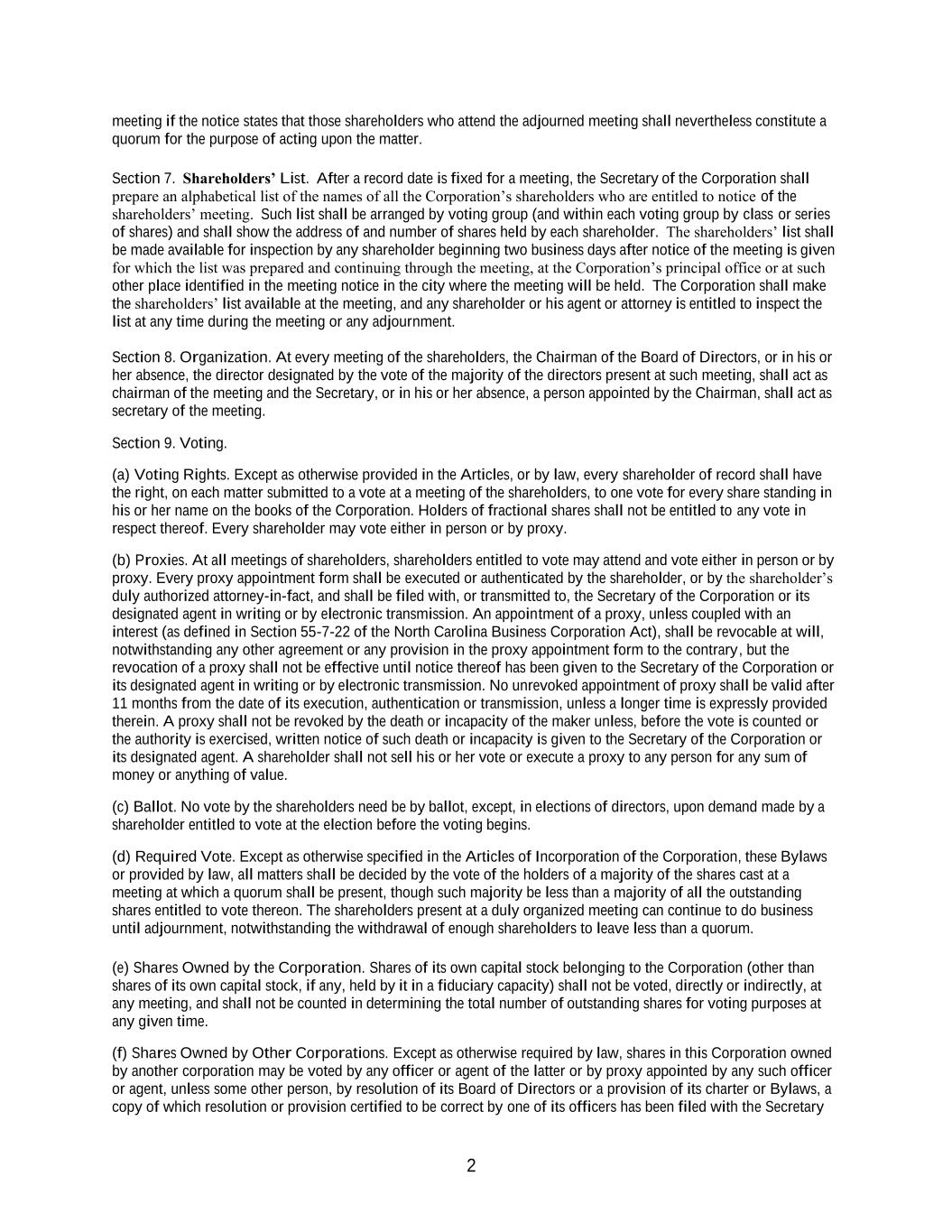
2 meeting if the notice states that those shareholders who attend the adjourned meeting shall nevertheless constitute a quorum for the purpose of acting upon the matter. Section 7. Shareholders’ List. After a record date is fixed for a meeting, the Secretary of the Corporation shall prepare an alphabetical list of the names of all the Corporation’s shareholders who are entitled to notice of the shareholders’ meeting. Such list shall be arranged by voting group (and within each voting group by class or series of shares) and shall show the address of and number of shares held by each shareholder. The shareholders’ list shall be made available for inspection by any shareholder beginning two business days after notice of the meeting is given for which the list was prepared and continuing through the meeting, at the Corporation’s principal office or at such other place identified in the meeting notice in the city where the meeting will be held. The Corporation shall make the shareholders’ list available at the meeting, and any shareholder or his agent or attorney is entitled to inspect the list at any time during the meeting or any adjournment. Section 8. Organization. At every meeting of the shareholders, the Chairman of the Board of Directors, or in his or her absence, the director designated by the vote of the majority of the directors present at such meeting, shall act as chairman of the meeting and the Secretary, or in his or her absence, a person appointed by the Chairman, shall act as secretary of the meeting. Section 9. Voting. (a) Voting Rights. Except as otherwise provided in the Articles, or by law, every shareholder of record shall have the right, on each matter submitted to a vote at a meeting of the shareholders, to one vote for every share standing in his or her name on the books of the Corporation. Holders of fractional shares shall not be entitled to any vote in respect thereof. Every shareholder may vote either in person or by proxy. (b) Proxies. At all meetings of shareholders, shareholders entitled to vote may attend and vote either in person or by proxy. Every proxy appointment form shall be executed or authenticated by the shareholder, or by the shareholder’s duly authorized attorney-in-fact, and shall be filed with, or transmitted to, the Secretary of the Corporation or its designated agent in writing or by electronic transmission. An appointment of a proxy, unless coupled with an interest (as defined in Section 55-7-22 of the North Carolina Business Corporation Act), shall be revocable at will, notwithstanding any other agreement or any provision in the proxy appointment form to the contrary, but the revocation of a proxy shall not be effective until notice thereof has been given to the Secretary of the Corporation or its designated agent in writing or by electronic transmission. No unrevoked appointment of proxy shall be valid after 11 months from the date of its execution, authentication or transmission, unless a longer time is expressly provided therein. A proxy shall not be revoked by the death or incapacity of the maker unless, before the vote is counted or the authority is exercised, written notice of such death or incapacity is given to the Secretary of the Corporation or its designated agent. A shareholder shall not sell his or her vote or execute a proxy to any person for any sum of money or anything of value. (c) Ballot. No vote by the shareholders need be by ballot, except, in elections of directors, upon demand made by a shareholder entitled to vote at the election before the voting begins. (d) Required Vote. Except as otherwise specified in the Articles of Incorporation of the Corporation, these Bylaws or provided by law, all matters shall be decided by the vote of the holders of a majority of the shares cast at a meeting at which a quorum shall be present, though such majority be less than a majority of all the outstanding shares entitled to vote thereon. The shareholders present at a duly organized meeting can continue to do business until adjournment, notwithstanding the withdrawal of enough shareholders to leave less than a quorum. (e) Shares Owned by the Corporation. Shares of its own capital stock belonging to the Corporation (other than shares of its own capital stock, if any, held by it in a fiduciary capacity) shall not be voted, directly or indirectly, at any meeting, and shall not be counted in determining the total number of outstanding shares for voting purposes at any given time. (f) Shares Owned by Other Corporations. Except as otherwise required by law, shares in this Corporation owned by another corporation may be voted by any officer or agent of the latter or by proxy appointed by any such officer or agent, unless some other person, by resolution of its Board of Directors or a provision of its charter or Bylaws, a copy of which resolution or provision certified to be correct by one of its officers has been filed with the Secretary
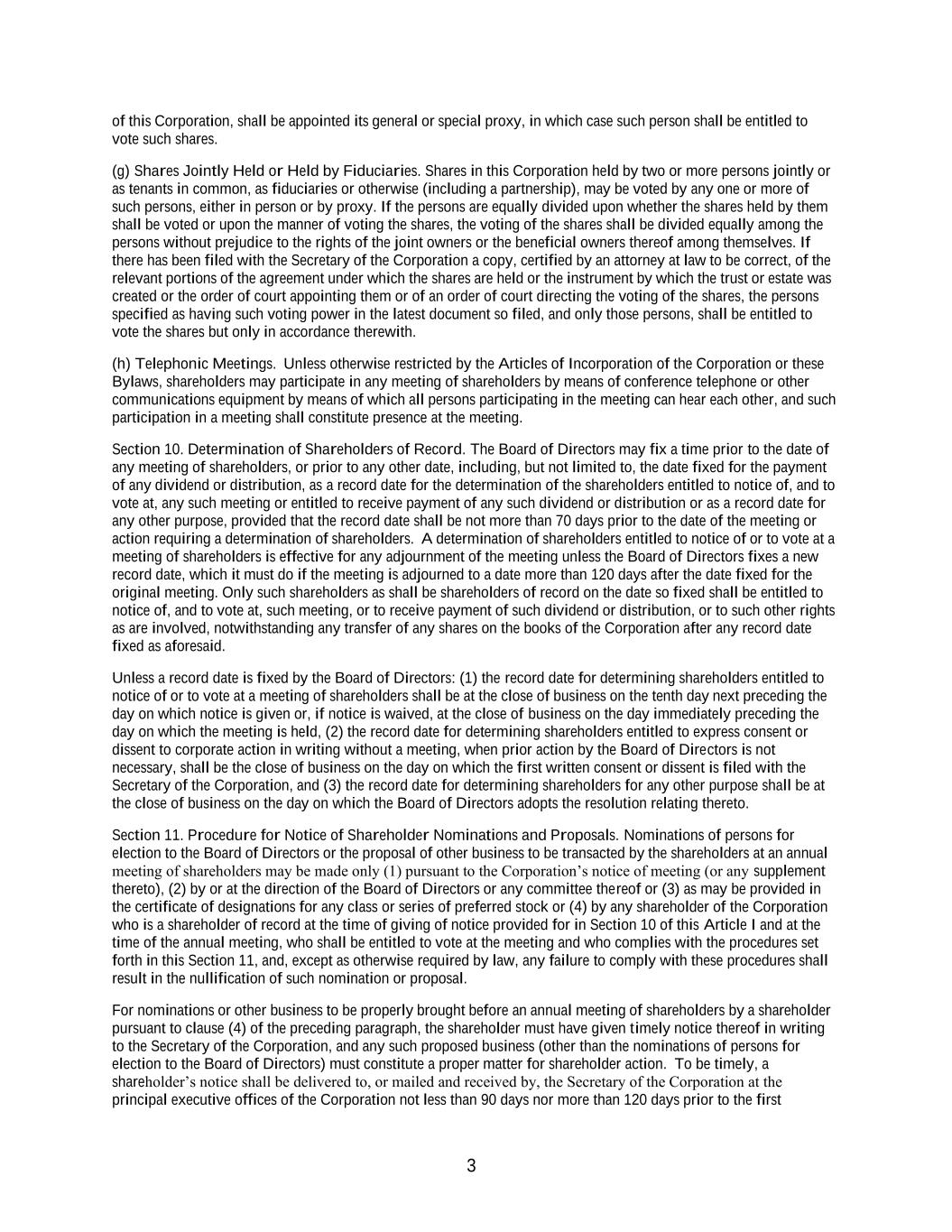
3 of this Corporation, shall be appointed its general or special proxy, in which case such person shall be entitled to vote such shares. (g) Shares Jointly Held or Held by Fiduciaries. Shares in this Corporation held by two or more persons jointly or as tenants in common, as fiduciaries or otherwise (including a partnership), may be voted by any one or more of such persons, either in person or by proxy. If the persons are equally divided upon whether the shares held by them shall be voted or upon the manner of voting the shares, the voting of the shares shall be divided equally among the persons without prejudice to the rights of the joint owners or the beneficial owners thereof among themselves. If there has been filed with the Secretary of the Corporation a copy, certified by an attorney at law to be correct, of the relevant portions of the agreement under which the shares are held or the instrument by which the trust or estate was created or the order of court appointing them or of an order of court directing the voting of the shares, the persons specified as having such voting power in the latest document so filed, and only those persons, shall be entitled to vote the shares but only in accordance therewith. (h) Telephonic Meetings. Unless otherwise restricted by the Articles of Incorporation of the Corporation or these Bylaws, shareholders may participate in any meeting of shareholders by means of conference telephone or other communications equipment by means of which all persons participating in the meeting can hear each other, and such participation in a meeting shall constitute presence at the meeting. Section 10. Determination of Shareholders of Record. The Board of Directors may fix a time prior to the date of any meeting of shareholders, or prior to any other date, including, but not limited to, the date fixed for the payment of any dividend or distribution, as a record date for the determination of the shareholders entitled to notice of, and to vote at, any such meeting or entitled to receive payment of any such dividend or distribution or as a record date for any other purpose, provided that the record date shall be not more than 70 days prior to the date of the meeting or action requiring a determination of shareholders. A determination of shareholders entitled to notice of or to vote at a meeting of shareholders is effective for any adjournment of the meeting unless the Board of Directors fixes a new record date, which it must do if the meeting is adjourned to a date more than 120 days after the date fixed for the original meeting. Only such shareholders as shall be shareholders of record on the date so fixed shall be entitled to notice of, and to vote at, such meeting, or to receive payment of such dividend or distribution, or to such other rights as are involved, notwithstanding any transfer of any shares on the books of the Corporation after any record date fixed as aforesaid. Unless a record date is fixed by the Board of Directors: (1) the record date for determining shareholders entitled to notice of or to vote at a meeting of shareholders shall be at the close of business on the tenth day next preceding the day on which notice is given or, if notice is waived, at the close of business on the day immediately preceding the day on which the meeting is held, (2) the record date for determining shareholders entitled to express consent or dissent to corporate action in writing without a meeting, when prior action by the Board of Directors is not necessary, shall be the close of business on the day on which the first written consent or dissent is filed with the Secretary of the Corporation, and (3) the record date for determining shareholders for any other purpose shall be at the close of business on the day on which the Board of Directors adopts the resolution relating thereto. Section 11. Procedure for Notice of Shareholder Nominations and Proposals. Nominations of persons for election to the Board of Directors or the proposal of other business to be transacted by the shareholders at an annual meeting of shareholders may be made only (1) pursuant to the Corporation’s notice of meeting (or any supplement thereto), (2) by or at the direction of the Board of Directors or any committee thereof or (3) as may be provided in the certificate of designations for any class or series of preferred stock or (4) by any shareholder of the Corporation who is a shareholder of record at the time of giving of notice provided for in Section 10 of this Article I and at the time of the annual meeting, who shall be entitled to vote at the meeting and who complies with the procedures set forth in this Section 11, and, except as otherwise required by law, any failure to comply with these procedures shall result in the nullification of such nomination or proposal. For nominations or other business to be properly brought before an annual meeting of shareholders by a shareholder pursuant to clause (4) of the preceding paragraph, the shareholder must have given timely notice thereof in writing to the Secretary of the Corporation, and any such proposed business (other than the nominations of persons for election to the Board of Directors) must constitute a proper matter for shareholder action. To be timely, a shareholder’s notice shall be delivered to, or mailed and received by, the Secretary of the Corporation at the principal executive offices of the Corporation not less than 90 days nor more than 120 days prior to the first
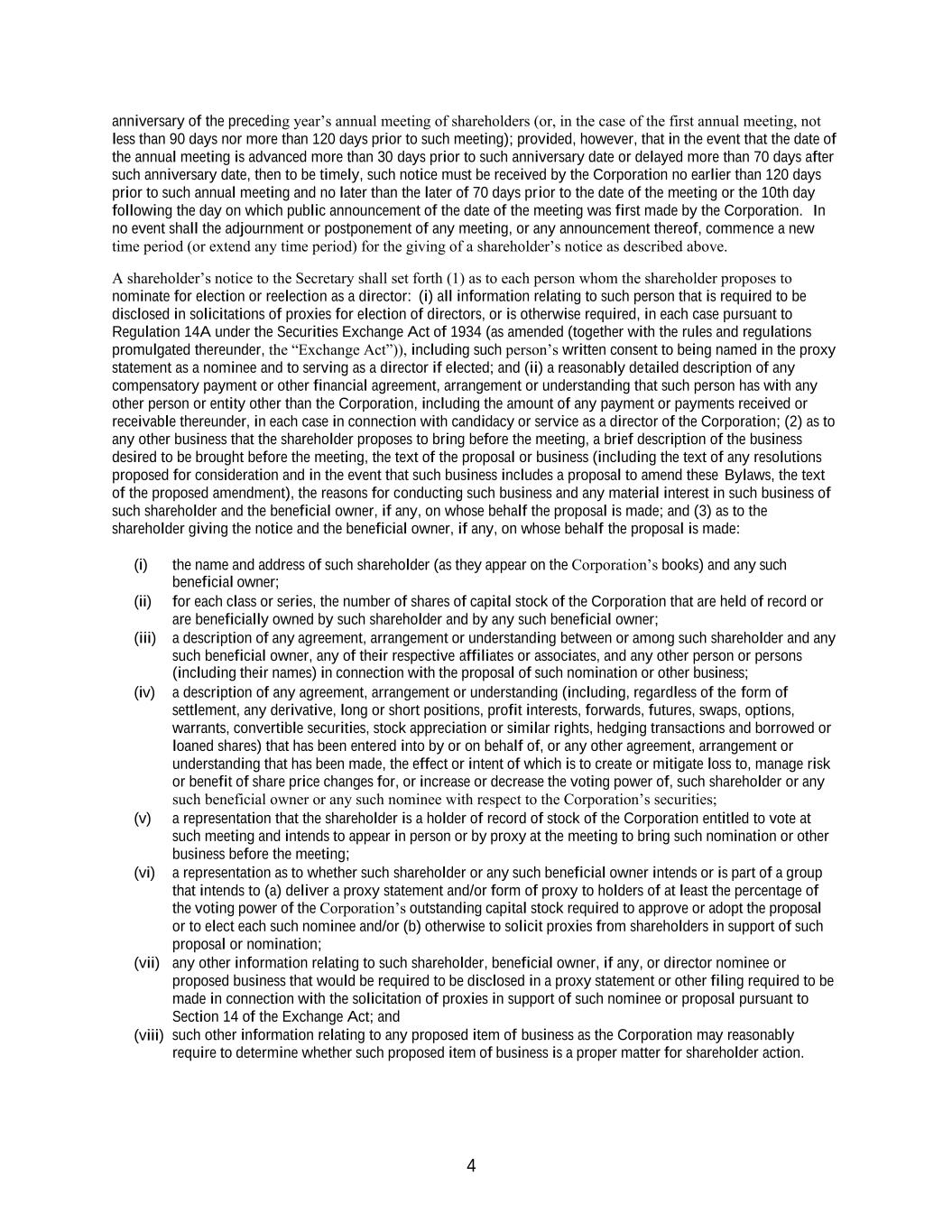
4 anniversary of the preceding year’s annual meeting of shareholders (or, in the case of the first annual meeting, not less than 90 days nor more than 120 days prior to such meeting); provided, however, that in the event that the date of the annual meeting is advanced more than 30 days prior to such anniversary date or delayed more than 70 days after such anniversary date, then to be timely, such notice must be received by the Corporation no earlier than 120 days prior to such annual meeting and no later than the later of 70 days prior to the date of the meeting or the 10th day following the day on which public announcement of the date of the meeting was first made by the Corporation. In no event shall the adjournment or postponement of any meeting, or any announcement thereof, commence a new time period (or extend any time period) for the giving of a shareholder’s notice as described above. A shareholder’s notice to the Secretary shall set forth (1) as to each person whom the shareholder proposes to nominate for election or reelection as a director: (i) all information relating to such person that is required to be disclosed in solicitations of proxies for election of directors, or is otherwise required, in each case pursuant to Regulation 14A under the Securities Exchange Act of 1934 (as amended (together with the rules and regulations promulgated thereunder, the “Exchange Act”)), including such person’s written consent to being named in the proxy statement as a nominee and to serving as a director if elected; and (ii) a reasonably detailed description of any compensatory payment or other financial agreement, arrangement or understanding that such person has with any other person or entity other than the Corporation, including the amount of any payment or payments received or receivable thereunder, in each case in connection with candidacy or service as a director of the Corporation; (2) as to any other business that the shareholder proposes to bring before the meeting, a brief description of the business desired to be brought before the meeting, the text of the proposal or business (including the text of any resolutions proposed for consideration and in the event that such business includes a proposal to amend these Bylaws, the text of the proposed amendment), the reasons for conducting such business and any material interest in such business of such shareholder and the beneficial owner, if any, on whose behalf the proposal is made; and (3) as to the shareholder giving the notice and the beneficial owner, if any, on whose behalf the proposal is made: (i) the name and address of such shareholder (as they appear on the Corporation’s books) and any such beneficial owner; (ii) for each class or series, the number of shares of capital stock of the Corporation that are held of record or are beneficially owned by such shareholder and by any such beneficial owner; (iii) a description of any agreement, arrangement or understanding between or among such shareholder and any such beneficial owner, any of their respective affiliates or associates, and any other person or persons (including their names) in connection with the proposal of such nomination or other business; (iv) a description of any agreement, arrangement or understanding (including, regardless of the form of settlement, any derivative, long or short positions, profit interests, forwards, futures, swaps, options, warrants, convertible securities, stock appreciation or similar rights, hedging transactions and borrowed or loaned shares) that has been entered into by or on behalf of, or any other agreement, arrangement or understanding that has been made, the effect or intent of which is to create or mitigate loss to, manage risk or benefit of share price changes for, or increase or decrease the voting power of, such shareholder or any such beneficial owner or any such nominee with respect to the Corporation’s securities; (v) a representation that the shareholder is a holder of record of stock of the Corporation entitled to vote at such meeting and intends to appear in person or by proxy at the meeting to bring such nomination or other business before the meeting; (vi) a representation as to whether such shareholder or any such beneficial owner intends or is part of a group that intends to (a) deliver a proxy statement and/or form of proxy to holders of at least the percentage of the voting power of the Corporation’s outstanding capital stock required to approve or adopt the proposal or to elect each such nominee and/or (b) otherwise to solicit proxies from shareholders in support of such proposal or nomination; (vii) any other information relating to such shareholder, beneficial owner, if any, or director nominee or proposed business that would be required to be disclosed in a proxy statement or other filing required to be made in connection with the solicitation of proxies in support of such nominee or proposal pursuant to Section 14 of the Exchange Act; and (viii) such other information relating to any proposed item of business as the Corporation may reasonably require to determine whether such proposed item of business is a proper matter for shareholder action.
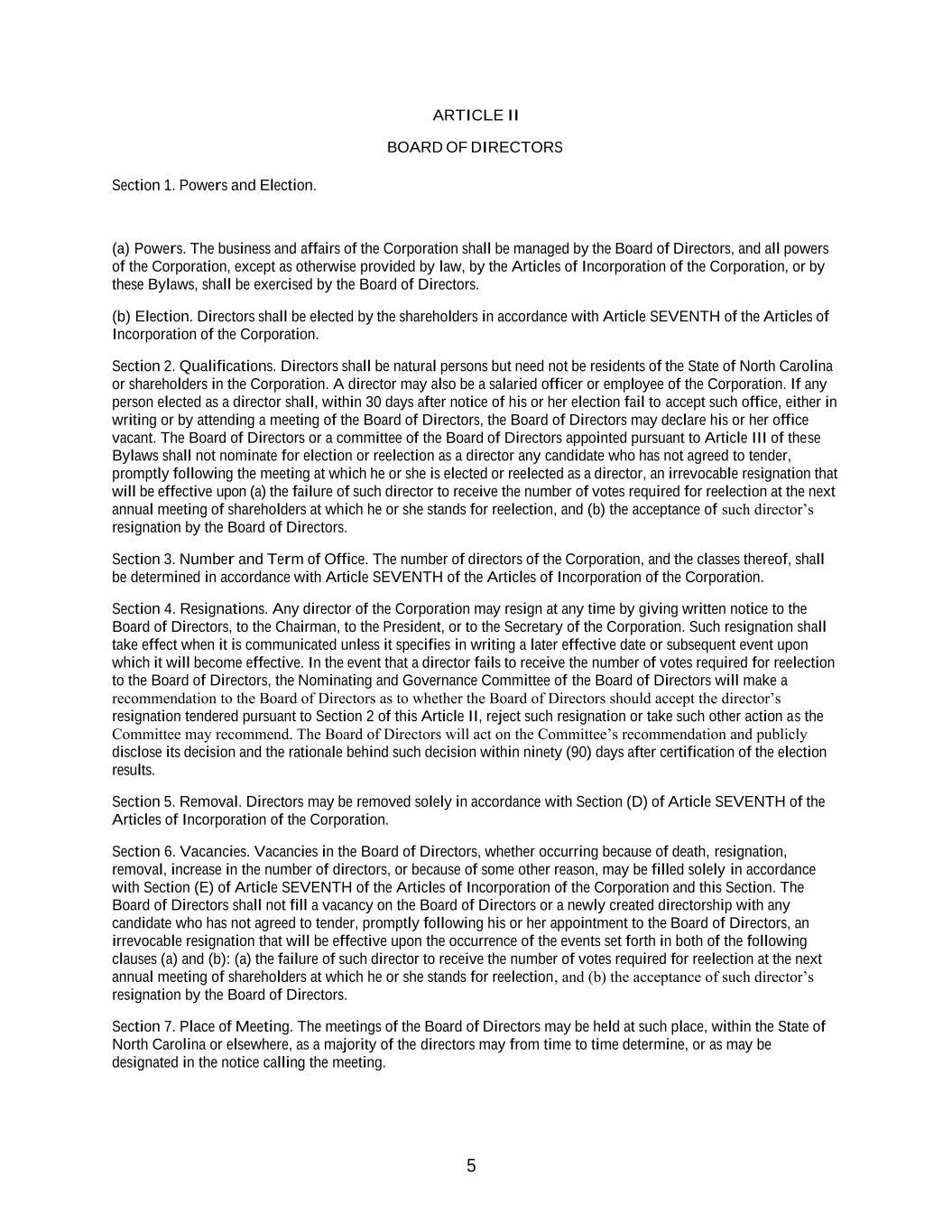
5 Section 1. Powers and Election. ARTICLE II BOARD OF DIRECTORS (a) Powers. The business and affairs of the Corporation shall be managed by the Board of Directors, and all powers of the Corporation, except as otherwise provided by law, by the Articles of Incorporation of the Corporation, or by these Bylaws, shall be exercised by the Board of Directors. (b) Election. Directors shall be elected by the shareholders in accordance with Article SEVENTH of the Articles of Incorporation of the Corporation. Section 2. Qualifications. Directors shall be natural persons but need not be residents of the State of North Carolina or shareholders in the Corporation. A director may also be a salaried officer or employee of the Corporation. If any person elected as a director shall, within 30 days after notice of his or her election fail to accept such office, either in writing or by attending a meeting of the Board of Directors, the Board of Directors may declare his or her office vacant. The Board of Directors or a committee of the Board of Directors appointed pursuant to Article III of these Bylaws shall not nominate for election or reelection as a director any candidate who has not agreed to tender, promptly following the meeting at which he or she is elected or reelected as a director, an irrevocable resignation that will be effective upon (a) the failure of such director to receive the number of votes required for reelection at the next annual meeting of shareholders at which he or she stands for reelection, and (b) the acceptance of such director’s resignation by the Board of Directors. Section 3. Number and Term of Office. The number of directors of the Corporation, and the classes thereof, shall be determined in accordance with Article SEVENTH of the Articles of Incorporation of the Corporation. Section 4. Resignations. Any director of the Corporation may resign at any time by giving written notice to the Board of Directors, to the Chairman, to the President, or to the Secretary of the Corporation. Such resignation shall take effect when it is communicated unless it specifies in writing a later effective date or subsequent event upon which it will become effective. In the event that a director fails to receive the number of votes required for reelection to the Board of Directors, the Nominating and Governance Committee of the Board of Directors will make a recommendation to the Board of Directors as to whether the Board of Directors should accept the director’s resignation tendered pursuant to Section 2 of this Article II, reject such resignation or take such other action as the Committee may recommend. The Board of Directors will act on the Committee’s recommendation and publicly disclose its decision and the rationale behind such decision within ninety (90) days after certification of the election results. Section 5. Removal. Directors may be removed solely in accordance with Section (D) of Article SEVENTH of the Articles of Incorporation of the Corporation. Section 6. Vacancies. Vacancies in the Board of Directors, whether occurring because of death, resignation, removal, increase in the number of directors, or because of some other reason, may be filled solely in accordance with Section (E) of Article SEVENTH of the Articles of Incorporation of the Corporation and this Section. The Board of Directors shall not fill a vacancy on the Board of Directors or a newly created directorship with any candidate who has not agreed to tender, promptly following his or her appointment to the Board of Directors, an irrevocable resignation that will be effective upon the occurrence of the events set forth in both of the following clauses (a) and (b): (a) the failure of such director to receive the number of votes required for reelection at the next annual meeting of shareholders at which he or she stands for reelection, and (b) the acceptance of such director’s resignation by the Board of Directors. Section 7. Place of Meeting. The meetings of the Board of Directors may be held at such place, within the State of North Carolina or elsewhere, as a majority of the directors may from time to time determine, or as may be designated in the notice calling the meeting.
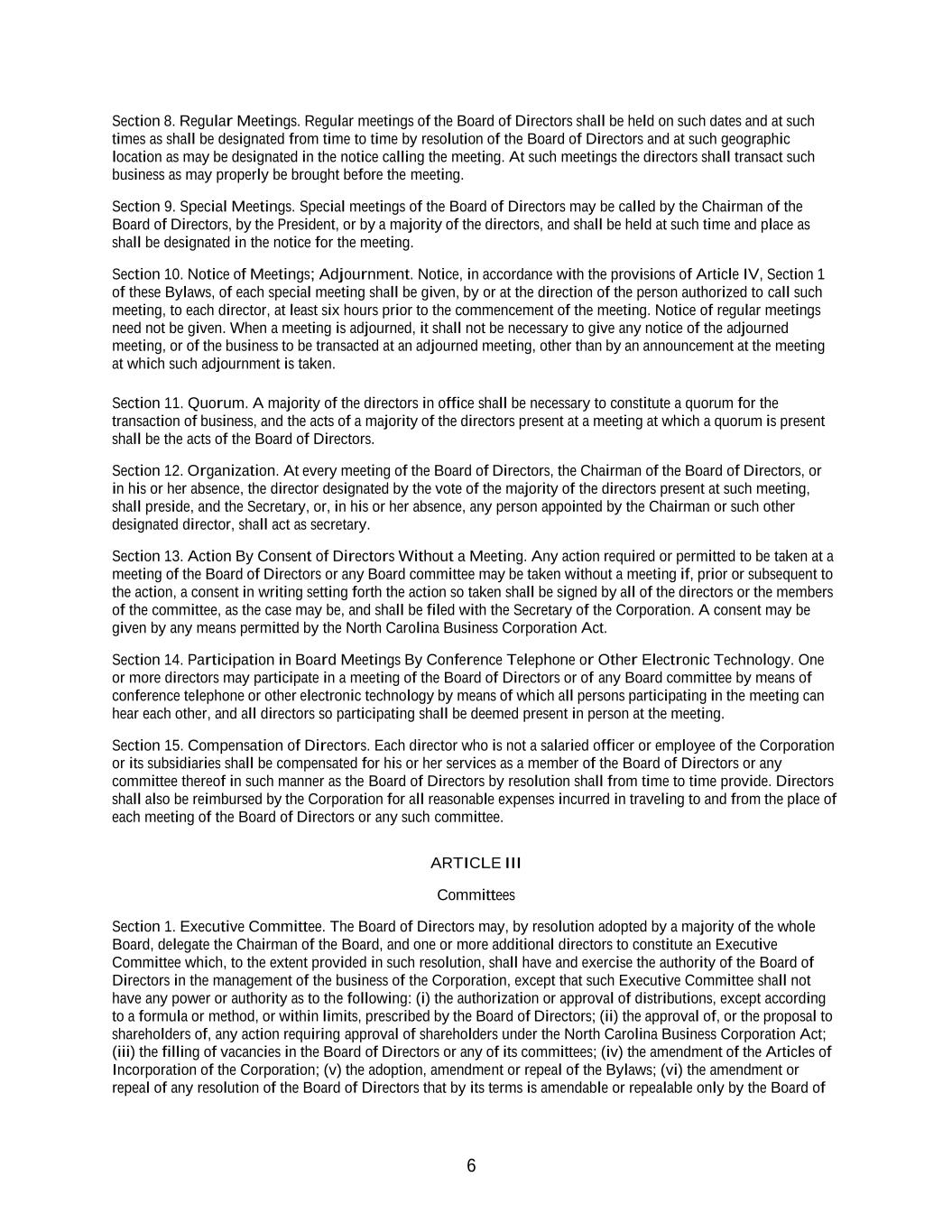
6 Section 8. Regular Meetings. Regular meetings of the Board of Directors shall be held on such dates and at such times as shall be designated from time to time by resolution of the Board of Directors and at such geographic location as may be designated in the notice calling the meeting. At such meetings the directors shall transact such business as may properly be brought before the meeting. Section 9. Special Meetings. Special meetings of the Board of Directors may be called by the Chairman of the Board of Directors, by the President, or by a majority of the directors, and shall be held at such time and place as shall be designated in the notice for the meeting. Section 10. Notice of Meetings; Adjournment. Notice, in accordance with the provisions of Article IV, Section 1 of these Bylaws, of each special meeting shall be given, by or at the direction of the person authorized to call such meeting, to each director, at least six hours prior to the commencement of the meeting. Notice of regular meetings need not be given. When a meeting is adjourned, it shall not be necessary to give any notice of the adjourned meeting, or of the business to be transacted at an adjourned meeting, other than by an announcement at the meeting at which such adjournment is taken. Section 11. Quorum. A majority of the directors in office shall be necessary to constitute a quorum for the transaction of business, and the acts of a majority of the directors present at a meeting at which a quorum is present shall be the acts of the Board of Directors. Section 12. Organization. At every meeting of the Board of Directors, the Chairman of the Board of Directors, or in his or her absence, the director designated by the vote of the majority of the directors present at such meeting, shall preside, and the Secretary, or, in his or her absence, any person appointed by the Chairman or such other designated director, shall act as secretary. Section 13. Action By Consent of Directors Without a Meeting. Any action required or permitted to be taken at a meeting of the Board of Directors or any Board committee may be taken without a meeting if, prior or subsequent to the action, a consent in writing setting forth the action so taken shall be signed by all of the directors or the members of the committee, as the case may be, and shall be filed with the Secretary of the Corporation. A consent may be given by any means permitted by the North Carolina Business Corporation Act. Section 14. Participation in Board Meetings By Conference Telephone or Other Electronic Technology. One or more directors may participate in a meeting of the Board of Directors or of any Board committee by means of conference telephone or other electronic technology by means of which all persons participating in the meeting can hear each other, and all directors so participating shall be deemed present in person at the meeting. Section 15. Compensation of Directors. Each director who is not a salaried officer or employee of the Corporation or its subsidiaries shall be compensated for his or her services as a member of the Board of Directors or any committee thereof in such manner as the Board of Directors by resolution shall from time to time provide. Directors shall also be reimbursed by the Corporation for all reasonable expenses incurred in traveling to and from the place of each meeting of the Board of Directors or any such committee. ARTICLE III Committees Section 1. Executive Committee. The Board of Directors may, by resolution adopted by a majority of the whole Board, delegate the Chairman of the Board, and one or more additional directors to constitute an Executive Committee which, to the extent provided in such resolution, shall have and exercise the authority of the Board of Directors in the management of the business of the Corporation, except that such Executive Committee shall not have any power or authority as to the following: (i) the authorization or approval of distributions, except according to a formula or method, or within limits, prescribed by the Board of Directors; (ii) the approval of, or the proposal to shareholders of, any action requiring approval of shareholders under the North Carolina Business Corporation Act; (iii) the filling of vacancies in the Board of Directors or any of its committees; (iv) the amendment of the Articles of Incorporation of the Corporation; (v) the adoption, amendment or repeal of the Bylaws; (vi) the amendment or repeal of any resolution of the Board of Directors that by its terms is amendable or repealable only by the Board of
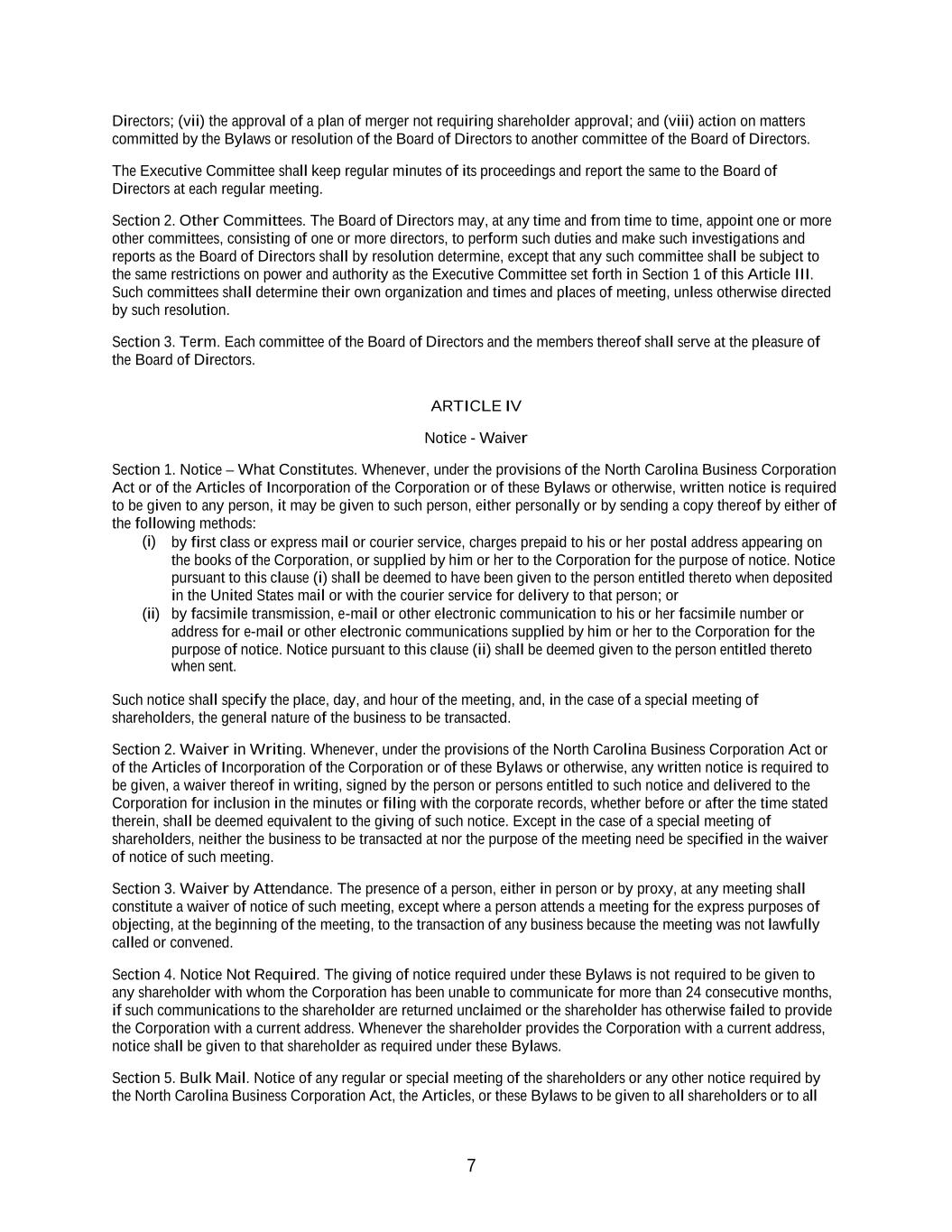
7 Directors; (vii) the approval of a plan of merger not requiring shareholder approval; and (viii) action on matters committed by the Bylaws or resolution of the Board of Directors to another committee of the Board of Directors. The Executive Committee shall keep regular minutes of its proceedings and report the same to the Board of Directors at each regular meeting. Section 2. Other Committees. The Board of Directors may, at any time and from time to time, appoint one or more other committees, consisting of one or more directors, to perform such duties and make such investigations and reports as the Board of Directors shall by resolution determine, except that any such committee shall be subject to the same restrictions on power and authority as the Executive Committee set forth in Section 1 of this Article III. Such committees shall determine their own organization and times and places of meeting, unless otherwise directed by such resolution. Section 3. Term. Each committee of the Board of Directors and the members thereof shall serve at the pleasure of the Board of Directors. ARTICLE IV Notice - Waiver Section 1. Notice – What Constitutes. Whenever, under the provisions of the North Carolina Business Corporation Act or of the Articles of Incorporation of the Corporation or of these Bylaws or otherwise, written notice is required to be given to any person, it may be given to such person, either personally or by sending a copy thereof by either of the following methods: (i) by first class or express mail or courier service, charges prepaid to his or her postal address appearing on the books of the Corporation, or supplied by him or her to the Corporation for the purpose of notice. Notice pursuant to this clause (i) shall be deemed to have been given to the person entitled thereto when deposited in the United States mail or with the courier service for delivery to that person; or (ii) by facsimile transmission, e-mail or other electronic communication to his or her facsimile number or address for e-mail or other electronic communications supplied by him or her to the Corporation for the purpose of notice. Notice pursuant to this clause (ii) shall be deemed given to the person entitled thereto when sent. Such notice shall specify the place, day, and hour of the meeting, and, in the case of a special meeting of shareholders, the general nature of the business to be transacted. Section 2. Waiver in Writing. Whenever, under the provisions of the North Carolina Business Corporation Act or of the Articles of Incorporation of the Corporation or of these Bylaws or otherwise, any written notice is required to be given, a waiver thereof in writing, signed by the person or persons entitled to such notice and delivered to the Corporation for inclusion in the minutes or filing with the corporate records, whether before or after the time stated therein, shall be deemed equivalent to the giving of such notice. Except in the case of a special meeting of shareholders, neither the business to be transacted at nor the purpose of the meeting need be specified in the waiver of notice of such meeting. Section 3. Waiver by Attendance. The presence of a person, either in person or by proxy, at any meeting shall constitute a waiver of notice of such meeting, except where a person attends a meeting for the express purposes of objecting, at the beginning of the meeting, to the transaction of any business because the meeting was not lawfully called or convened. Section 4. Notice Not Required. The giving of notice required under these Bylaws is not required to be given to any shareholder with whom the Corporation has been unable to communicate for more than 24 consecutive months, if such communications to the shareholder are returned unclaimed or the shareholder has otherwise failed to provide the Corporation with a current address. Whenever the shareholder provides the Corporation with a current address, notice shall be given to that shareholder as required under these Bylaws. Section 5. Bulk Mail. Notice of any regular or special meeting of the shareholders or any other notice required by the North Carolina Business Corporation Act, the Articles, or these Bylaws to be given to all shareholders or to all
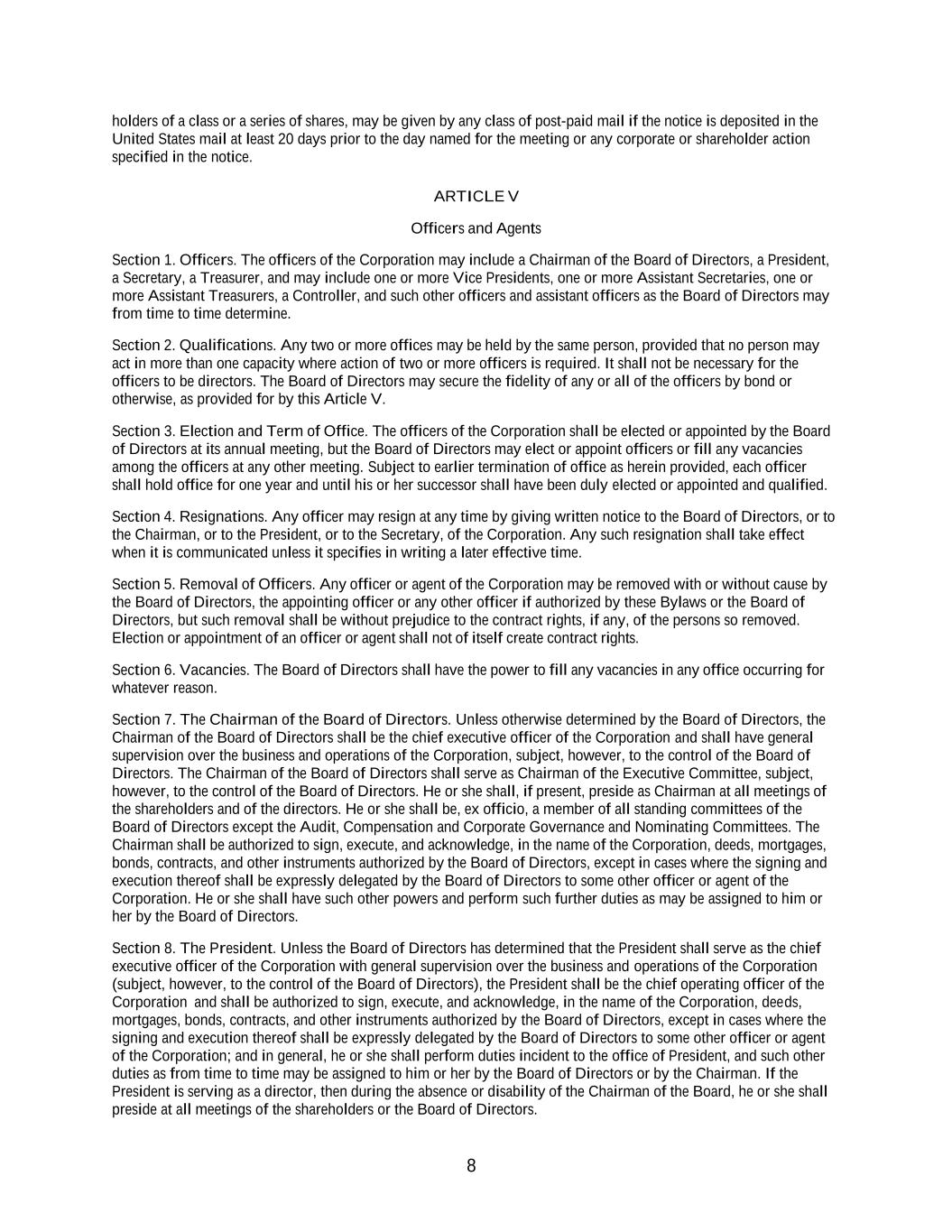
8 holders of a class or a series of shares, may be given by any class of post-paid mail if the notice is deposited in the United States mail at least 20 days prior to the day named for the meeting or any corporate or shareholder action specified in the notice. ARTICLE V Officers and Agents Section 1. Officers. The officers of the Corporation may include a Chairman of the Board of Directors, a President, a Secretary, a Treasurer, and may include one or more Vice Presidents, one or more Assistant Secretaries, one or more Assistant Treasurers, a Controller, and such other officers and assistant officers as the Board of Directors may from time to time determine. Section 2. Qualifications. Any two or more offices may be held by the same person, provided that no person may act in more than one capacity where action of two or more officers is required. It shall not be necessary for the officers to be directors. The Board of Directors may secure the fidelity of any or all of the officers by bond or otherwise, as provided for by this Article V. Section 3. Election and Term of Office. The officers of the Corporation shall be elected or appointed by the Board of Directors at its annual meeting, but the Board of Directors may elect or appoint officers or fill any vacancies among the officers at any other meeting. Subject to earlier termination of office as herein provided, each officer shall hold office for one year and until his or her successor shall have been duly elected or appointed and qualified. Section 4. Resignations. Any officer may resign at any time by giving written notice to the Board of Directors, or to the Chairman, or to the President, or to the Secretary, of the Corporation. Any such resignation shall take effect when it is communicated unless it specifies in writing a later effective time. Section 5. Removal of Officers. Any officer or agent of the Corporation may be removed with or without cause by the Board of Directors, the appointing officer or any other officer if authorized by these Bylaws or the Board of Directors, but such removal shall be without prejudice to the contract rights, if any, of the persons so removed. Election or appointment of an officer or agent shall not of itself create contract rights. Section 6. Vacancies. The Board of Directors shall have the power to fill any vacancies in any office occurring for whatever reason. Section 7. The Chairman of the Board of Directors. Unless otherwise determined by the Board of Directors, the Chairman of the Board of Directors shall be the chief executive officer of the Corporation and shall have general supervision over the business and operations of the Corporation, subject, however, to the control of the Board of Directors. The Chairman of the Board of Directors shall serve as Chairman of the Executive Committee, subject, however, to the control of the Board of Directors. He or she shall, if present, preside as Chairman at all meetings of the shareholders and of the directors. He or she shall be, ex officio, a member of all standing committees of the Board of Directors except the Audit, Compensation and Corporate Governance and Nominating Committees. The Chairman shall be authorized to sign, execute, and acknowledge, in the name of the Corporation, deeds, mortgages, bonds, contracts, and other instruments authorized by the Board of Directors, except in cases where the signing and execution thereof shall be expressly delegated by the Board of Directors to some other officer or agent of the Corporation. He or she shall have such other powers and perform such further duties as may be assigned to him or her by the Board of Directors. Section 8. The President. Unless the Board of Directors has determined that the President shall serve as the chief executive officer of the Corporation with general supervision over the business and operations of the Corporation (subject, however, to the control of the Board of Directors), the President shall be the chief operating officer of the Corporation and shall be authorized to sign, execute, and acknowledge, in the name of the Corporation, deeds, mortgages, bonds, contracts, and other instruments authorized by the Board of Directors, except in cases where the signing and execution thereof shall be expressly delegated by the Board of Directors to some other officer or agent of the Corporation; and in general, he or she shall perform duties incident to the office of President, and such other duties as from time to time may be assigned to him or her by the Board of Directors or by the Chairman. If the President is serving as a director, then during the absence or disability of the Chairman of the Board, he or she shall preside at all meetings of the shareholders or the Board of Directors.
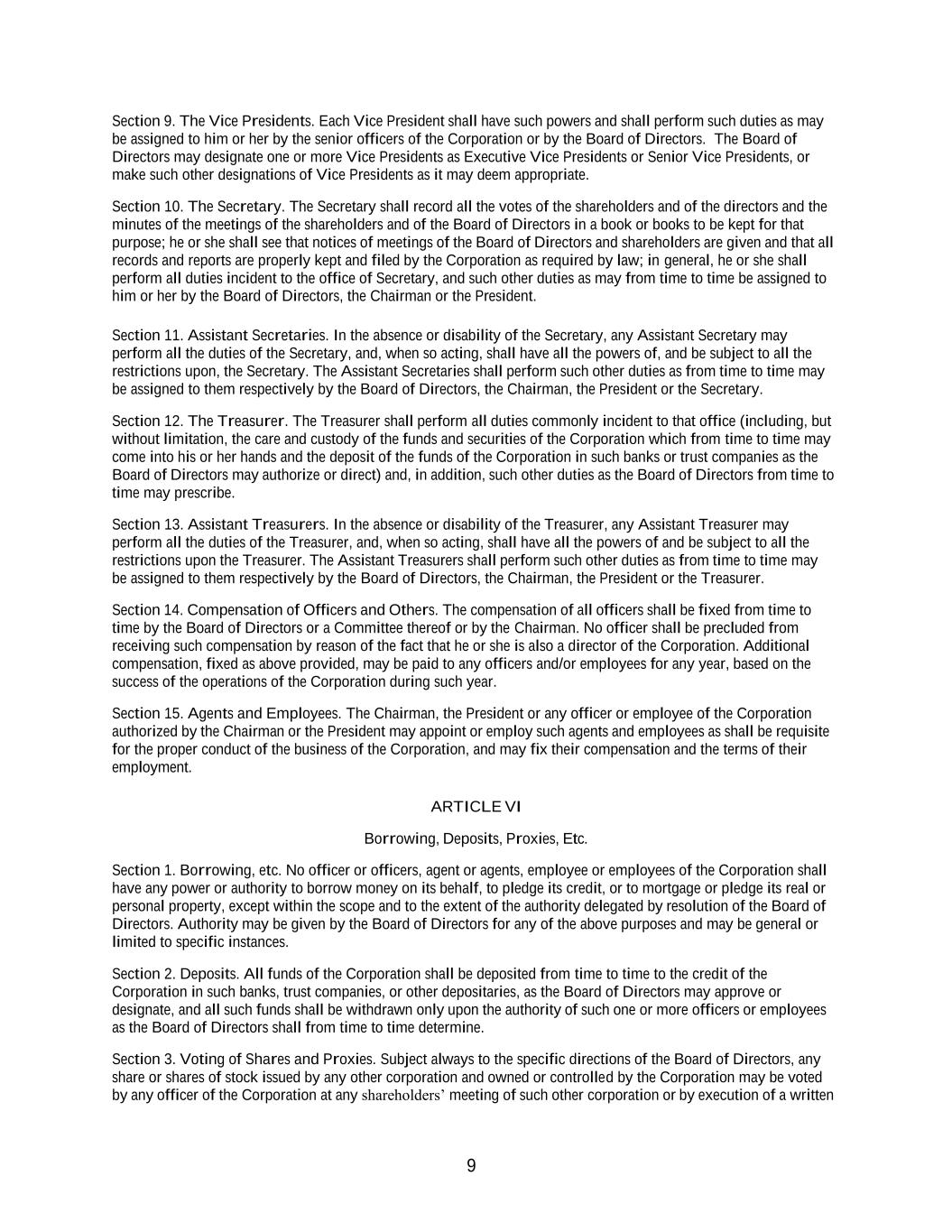
9 Section 9. The Vice Presidents. Each Vice President shall have such powers and shall perform such duties as may be assigned to him or her by the senior officers of the Corporation or by the Board of Directors. The Board of Directors may designate one or more Vice Presidents as Executive Vice Presidents or Senior Vice Presidents, or make such other designations of Vice Presidents as it may deem appropriate. Section 10. The Secretary. The Secretary shall record all the votes of the shareholders and of the directors and the minutes of the meetings of the shareholders and of the Board of Directors in a book or books to be kept for that purpose; he or she shall see that notices of meetings of the Board of Directors and shareholders are given and that all records and reports are properly kept and filed by the Corporation as required by law; in general, he or she shall perform all duties incident to the office of Secretary, and such other duties as may from time to time be assigned to him or her by the Board of Directors, the Chairman or the President. Section 11. Assistant Secretaries. In the absence or disability of the Secretary, any Assistant Secretary may perform all the duties of the Secretary, and, when so acting, shall have all the powers of, and be subject to all the restrictions upon, the Secretary. The Assistant Secretaries shall perform such other duties as from time to time may be assigned to them respectively by the Board of Directors, the Chairman, the President or the Secretary. Section 12. The Treasurer. The Treasurer shall perform all duties commonly incident to that office (including, but without limitation, the care and custody of the funds and securities of the Corporation which from time to time may come into his or her hands and the deposit of the funds of the Corporation in such banks or trust companies as the Board of Directors may authorize or direct) and, in addition, such other duties as the Board of Directors from time to time may prescribe. Section 13. Assistant Treasurers. In the absence or disability of the Treasurer, any Assistant Treasurer may perform all the duties of the Treasurer, and, when so acting, shall have all the powers of and be subject to all the restrictions upon the Treasurer. The Assistant Treasurers shall perform such other duties as from time to time may be assigned to them respectively by the Board of Directors, the Chairman, the President or the Treasurer. Section 14. Compensation of Officers and Others. The compensation of all officers shall be fixed from time to time by the Board of Directors or a Committee thereof or by the Chairman. No officer shall be precluded from receiving such compensation by reason of the fact that he or she is also a director of the Corporation. Additional compensation, fixed as above provided, may be paid to any officers and/or employees for any year, based on the success of the operations of the Corporation during such year. Section 15. Agents and Employees. The Chairman, the President or any officer or employee of the Corporation authorized by the Chairman or the President may appoint or employ such agents and employees as shall be requisite for the proper conduct of the business of the Corporation, and may fix their compensation and the terms of their employment. ARTICLE VI Borrowing, Deposits, Proxies, Etc. Section 1. Borrowing, etc. No officer or officers, agent or agents, employee or employees of the Corporation shall have any power or authority to borrow money on its behalf, to pledge its credit, or to mortgage or pledge its real or personal property, except within the scope and to the extent of the authority delegated by resolution of the Board of Directors. Authority may be given by the Board of Directors for any of the above purposes and may be general or limited to specific instances. Section 2. Deposits. All funds of the Corporation shall be deposited from time to time to the credit of the Corporation in such banks, trust companies, or other depositaries, as the Board of Directors may approve or designate, and all such funds shall be withdrawn only upon the authority of such one or more officers or employees as the Board of Directors shall from time to time determine. Section 3. Voting of Shares and Proxies. Subject always to the specific directions of the Board of Directors, any share or shares of stock issued by any other corporation and owned or controlled by the Corporation may be voted by any officer of the Corporation at any shareholders’ meeting of such other corporation or by execution of a written
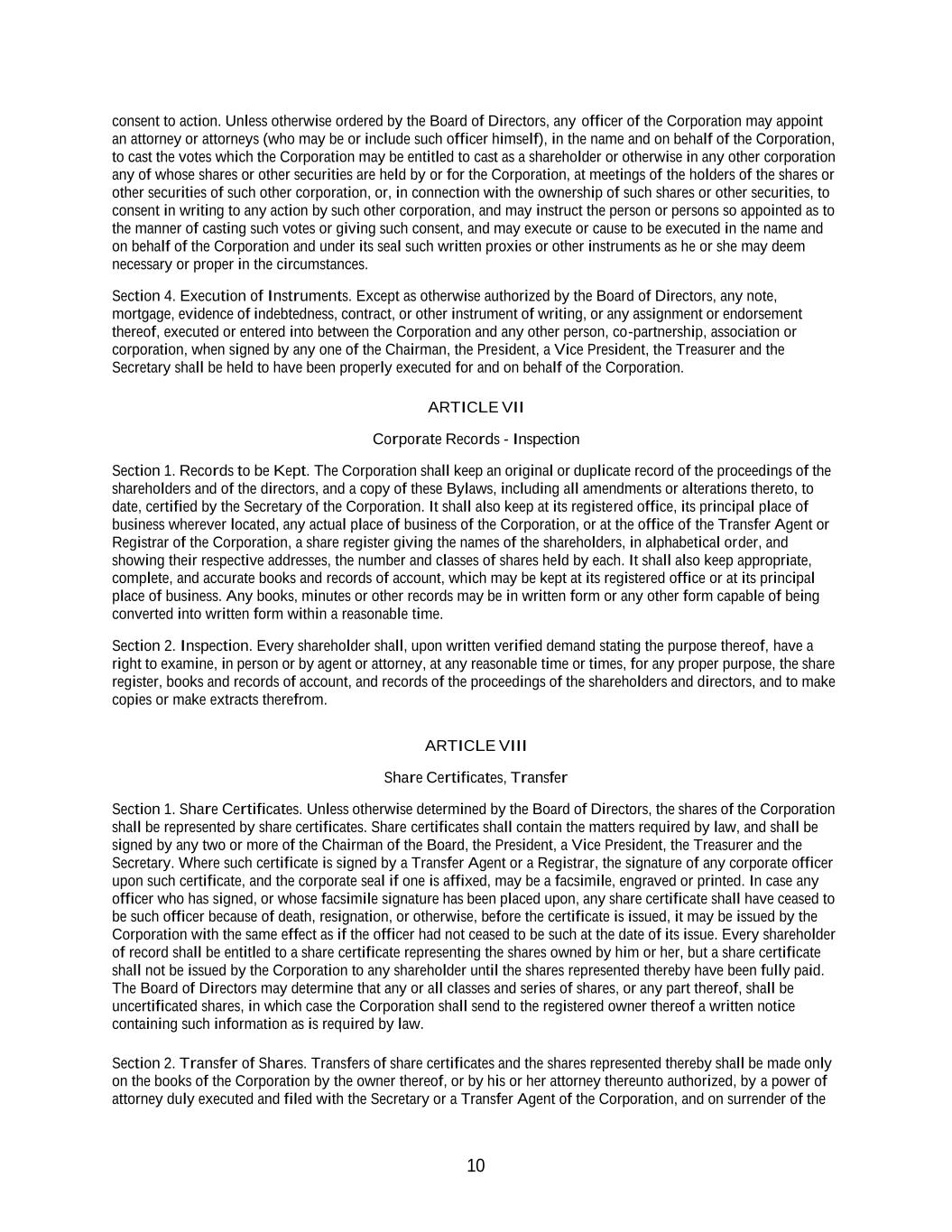
10 consent to action. Unless otherwise ordered by the Board of Directors, any officer of the Corporation may appoint an attorney or attorneys (who may be or include such officer himself), in the name and on behalf of the Corporation, to cast the votes which the Corporation may be entitled to cast as a shareholder or otherwise in any other corporation any of whose shares or other securities are held by or for the Corporation, at meetings of the holders of the shares or other securities of such other corporation, or, in connection with the ownership of such shares or other securities, to consent in writing to any action by such other corporation, and may instruct the person or persons so appointed as to the manner of casting such votes or giving such consent, and may execute or cause to be executed in the name and on behalf of the Corporation and under its seal such written proxies or other instruments as he or she may deem necessary or proper in the circumstances. Section 4. Execution of Instruments. Except as otherwise authorized by the Board of Directors, any note, mortgage, evidence of indebtedness, contract, or other instrument of writing, or any assignment or endorsement thereof, executed or entered into between the Corporation and any other person, co-partnership, association or corporation, when signed by any one of the Chairman, the President, a Vice President, the Treasurer and the Secretary shall be held to have been properly executed for and on behalf of the Corporation. ARTICLE VII Corporate Records - Inspection Section 1. Records to be Kept. The Corporation shall keep an original or duplicate record of the proceedings of the shareholders and of the directors, and a copy of these Bylaws, including all amendments or alterations thereto, to date, certified by the Secretary of the Corporation. It shall also keep at its registered office, its principal place of business wherever located, any actual place of business of the Corporation, or at the office of the Transfer Agent or Registrar of the Corporation, a share register giving the names of the shareholders, in alphabetical order, and showing their respective addresses, the number and classes of shares held by each. It shall also keep appropriate, complete, and accurate books and records of account, which may be kept at its registered office or at its principal place of business. Any books, minutes or other records may be in written form or any other form capable of being converted into written form within a reasonable time. Section 2. Inspection. Every shareholder shall, upon written verified demand stating the purpose thereof, have a right to examine, in person or by agent or attorney, at any reasonable time or times, for any proper purpose, the share register, books and records of account, and records of the proceedings of the shareholders and directors, and to make copies or make extracts therefrom. ARTICLE VIII Share Certificates, Transfer Section 1. Share Certificates. Unless otherwise determined by the Board of Directors, the shares of the Corporation shall be represented by share certificates. Share certificates shall contain the matters required by law, and shall be signed by any two or more of the Chairman of the Board, the President, a Vice President, the Treasurer and the Secretary. Where such certificate is signed by a Transfer Agent or a Registrar, the signature of any corporate officer upon such certificate, and the corporate seal if one is affixed, may be a facsimile, engraved or printed. In case any officer who has signed, or whose facsimile signature has been placed upon, any share certificate shall have ceased to be such officer because of death, resignation, or otherwise, before the certificate is issued, it may be issued by the Corporation with the same effect as if the officer had not ceased to be such at the date of its issue. Every shareholder of record shall be entitled to a share certificate representing the shares owned by him or her, but a share certificate shall not be issued by the Corporation to any shareholder until the shares represented thereby have been fully paid. The Board of Directors may determine that any or all classes and series of shares, or any part thereof, shall be uncertificated shares, in which case the Corporation shall send to the registered owner thereof a written notice containing such information as is required by law. Section 2. Transfer of Shares. Transfers of share certificates and the shares represented thereby shall be made only on the books of the Corporation by the owner thereof, or by his or her attorney thereunto authorized, by a power of attorney duly executed and filed with the Secretary or a Transfer Agent of the Corporation, and on surrender of the
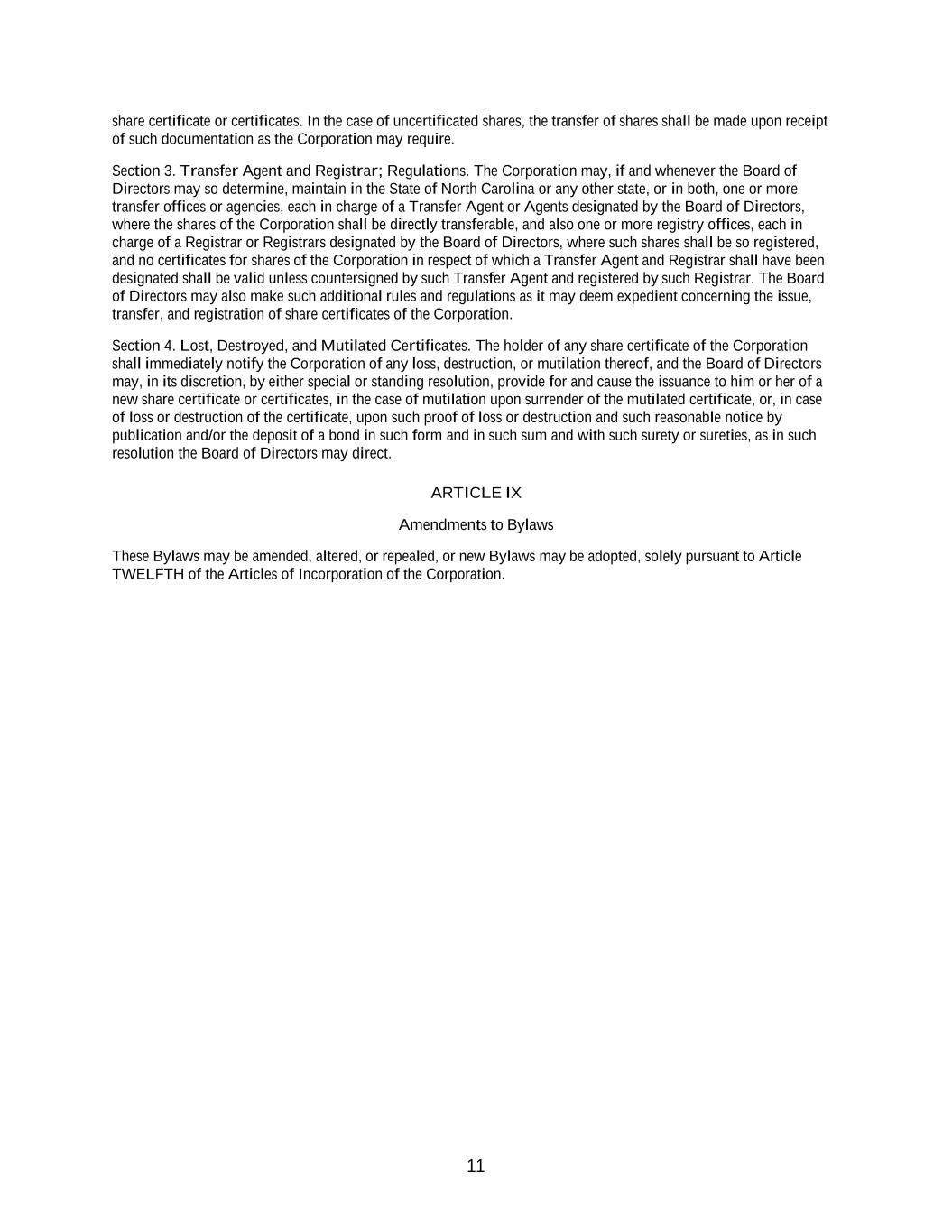
11 share certificate or certificates. In the case of uncertificated shares, the transfer of shares shall be made upon receipt of such documentation as the Corporation may require. Section 3. Transfer Agent and Registrar; Regulations. The Corporation may, if and whenever the Board of Directors may so determine, maintain in the State of North Carolina or any other state, or in both, one or more transfer offices or agencies, each in charge of a Transfer Agent or Agents designated by the Board of Directors, where the shares of the Corporation shall be directly transferable, and also one or more registry offices, each in charge of a Registrar or Registrars designated by the Board of Directors, where such shares shall be so registered, and no certificates for shares of the Corporation in respect of which a Transfer Agent and Registrar shall have been designated shall be valid unless countersigned by such Transfer Agent and registered by such Registrar. The Board of Directors may also make such additional rules and regulations as it may deem expedient concerning the issue, transfer, and registration of share certificates of the Corporation. Section 4. Lost, Destroyed, and Mutilated Certificates. The holder of any share certificate of the Corporation shall immediately notify the Corporation of any loss, destruction, or mutilation thereof, and the Board of Directors may, in its discretion, by either special or standing resolution, provide for and cause the issuance to him or her of a new share certificate or certificates, in the case of mutilation upon surrender of the mutilated certificate, or, in case of loss or destruction of the certificate, upon such proof of loss or destruction and such reasonable notice by publication and/or the deposit of a bond in such form and in such sum and with such surety or sureties, as in such resolution the Board of Directors may direct. ARTICLE IX Amendments to Bylaws These Bylaws may be amended, altered, or repealed, or new Bylaws may be adopted, solely pursuant to Article TWELFTH of the Articles of Incorporation of the Corporation.